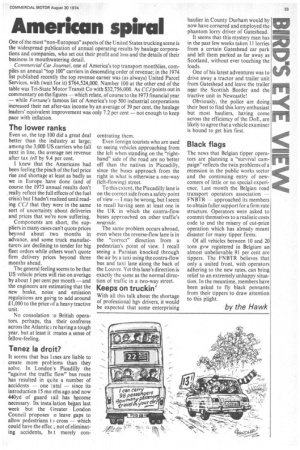American spiral
Page 35

If you've noticed an error in this article please click here to report it so we can fix it.
One of the most "non-European" aspects of the United States trucking scene is the widespread publication of annual operating results by haulage corporations and companies, who set out their profit and loss and the details of their business in mouthwatering detail.
Commercial Car Journal, one of America's top transport monthlies, compiles an annual "top 100" carriers in descending order of revenue; in the 1974 list published recently the top revenue earner was (as always) United Parcel Services, with (wait for it) $764,524,000. Number 100 at the other end of the table was Tri-State Motor Transit Co with $32,756,000. As CCJ points out in commentary on the figures — which relate, of course to the 1973 financial year — while Fortune's famous list of America's top 500 industrial corporations increased their net after-tax income by an average of 39 per cent, the haulage leaders' equivalent improvement was only 7.2 per cent — not enough to keep pace with inflation.
The lower ranks
Even so, the top 100 did a great deal better than the industry at large; among the 3,000 US carriers who fall next in line, the average net revenue after tax fell by 9.4 per cent.
I knew that the Americans had been feeling the pinch of the fuel price rise and shortage at least as badly as we in Europe have done (and of course the 1973 annual results don't really reflect the full effects of the fuel crisis) but I hadn't realized until reading CCJ that they were in the same sort of uncertainty about deliveries and prices that we're now suffering.
Components are short, the suppliers in many cases can't quote prices beyond about two months in advance, and some truck manufacturers are declining to tender for big fleet orders while others won't quote firm delivery prices beyond three months ahead.
The general feeling seems to be that US vehicle prices will rise on average by about 1 per cent per month — and the engineers are estimating that the new brake, noise and emission regulations are going to add around £1,000 to the price of a heavy tractive unit.
No consolation :o British operators, perhaps, tha their confreres across the Atlantic i• re having a tough year, but at least it :.reates a sense of fellow-feeling.
Tenez la droit?
It seems that bus lines are liable to create more prot [ems than they solve. In London 's Picadilly the "against the traffic flow" bus route has resulted in quite a number of accidents — one I atal — since its introduction 15 mo iths ago and now 440yd of guard i ail has become necessary. Its insta lation began last week but the Greater London Council proposes .o leave gaps to allow pedestrians t ) cross — which could have the effec :, not of eliminating accidents, bi 1 merely con centrating them.
Even foreign tourists who are used to seeing vehicles approaching from the left when standing on the "righthand" side of the road are no better off than the natives in Piccadilly, since the buses approach from the right in what is otherwise a one-way (left-flowing) street.
To this extent, the Piccadilly lane is on the correct side from a safety point of view — I may be wrong, but I seem to recall having seen at least one in the UK in which the contra-flow buses approached on other traffic's nearside.
The same problem occurs abroad, even where the reverse-flow lane is in the "correct" direction from a pedestrian's point of view. I recall seeing a Parisian knocked through the air by a taxi using the contra-flow bus and taxi lane along the back of the Louvre. Yet this lane's direction is exactly the same as the normal direction of traffic in a two-way street.
Keeps on truckin'
With all this talk about the shortage of professional hgv drivers, it would be expected that some enterprising haulier in County Durham would by now have cornered and employed the phantom lorry driver of Gateshead.
It seems that this mystery man has in the past few weeks taken 11 lorries from a certain Gateshead car park and left them parked as far away as Scotland, without ever touching the loads.
One of his latest adventures was to drive away a tractor and trailer unit from Gateshead and leave the trailer n9ar the Scottish Border and the tractive unit in Newcastle!
Obviously, the police are doing their best to find this lorry enthusiast but most hauliers, having come across the efficiency of the DoE, are likely to agree that a vehicle examiner is bound to get him first.
Black flags
The news that Belgian tipper operators are planning a "survival campaign" reflects the twin problems of a recession in the public works sector and the continuing entry of newcomers of little or no special experience. Last month the Belgian road transport operators association — FNBTR — approached its members to obtain fuller support for a firm rate structure. Operators were asked to commit themselves to a realistic costs code to end the misery of cut-price operation which has already meant disaster for many tipper firms.
Of all vehicles between 10 and 20 tons gvw registered in Belgium an almost unbelievable 91 per cent are tippers. The FNBTR believes that only a united front, with operators adhering to the new rates, can bring relief to an extremely unhappy situation. In the meantime, members have been asked to fly black pennants from their tippers to draw attention to this plight.
by the Hawk




































































































